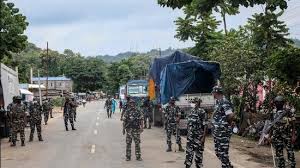CRPF VPN Outside: Enhancing Security and Connectivity for the Central Reserve Police Force

Introduction
The Central Reserve Police Force (CRPF) is one of the largest paramilitary forces in India, tasked with maintaining law and order, counter-insurgency operations, and various other critical duties. In an era where digital communication is paramount, ensuring the security and reliability of online interactions for CRPF personnel crpf vpn outside is crucial. This is where Virtual Private Networks (VPNs) come into play. This article delves into the importance, implementation, and benefits of using a VPN for CRPF personnel, particularly when accessing networks from outside secure premises.
Understanding VPNs
A Virtual Private Network (VPN) is a technology that creates a secure and encrypted connection over a less secure network, such as the internet. It allows users to send and receive data as if their devices were directly connected to a private network, thus ensuring privacy and security. For organizations like the CRPF, VPNs are essential tools that help safeguard sensitive information from potential cyber threats.
The Need for VPNs in CRPF
Given the nature of the CRPF’s operations, the force handles a significant amount of sensitive and classified information. Communication between different units, sharing of intelligence reports, and coordination of operations often occur over digital platforms. Without adequate protection, these communications are vulnerable to interception, potentially compromising national security. A VPN mitigates these risks by encrypting data, making it difficult for unauthorized entities to access or decipher the information.
Key Benefits of VPNs for CRPF
1. Enhanced Security
VPNs provide an additional layer of security by encrypting data transmissions. This ensures that even if data is intercepted, it remains unintelligible to unauthorized users. For the CRPF, this means secure communication channels for strategizing and executing operations, sharing intelligence, and coordinating with other security agencies.
2. Remote Access
CRPF personnel are often deployed in remote and hostile environments where secure communication infrastructure may not be readily available. VPNs enable secure access to the CRPF’s internal networks from any location, ensuring that personnel can stay connected and updated with the latest information and directives.
3. Bypassing Geographical Restrictions
In certain situations, CRPF personnel might be deployed internationally for training or joint operations. VPNs can help bypass geographical restrictions, allowing them to access CRPF’s internal resources and Indian websites securely from abroad. This ensures seamless communication and access to necessary information without compromising security.
4. Maintaining Anonymity
Using a VPN masks the user’s IP address, making it difficult to trace their online activities. For CRPF personnel conducting covert operations or accessing sensitive information, this anonymity is crucial to prevent detection and maintain operational security.
Implementation of VPNs in CRPF
1. Choosing the Right VPN
Selecting a reliable and robust VPN service is the first step. The CRPF needs a VPN that offers strong encryption, a no-logs policy, high-speed connections, and servers in multiple locations. Additionally, the chosen VPN should be capable of handling large volumes of data without compromising on performance.
2. Training and Awareness
Implementing a VPN is not just about technology; it also involves training CRPF personnel on its proper use. Comprehensive training programs should be conducted to educate personnel about the importance of VPNs, how to use them, and best practices for maintaining security. Regular refresher courses can help keep personnel updated on the latest security protocols.
3. Integration with Existing Systems
The VPN solution should be seamlessly integrated with the CRPF’s existing communication and IT infrastructure. This includes ensuring compatibility with various devices used by personnel, such as computers, smartphones, and tablets. A well-integrated system minimizes disruptions and enhances overall efficiency.
4. Continuous Monitoring and Updates
Cyber threats are constantly evolving, and so should the security measures. The CRPF must continuously monitor the effectiveness of their VPN solution and stay updated with the latest security patches and updates. Regular audits and assessments can help identify potential vulnerabilities and address them promptly.
Challenges and Solutions
1. Connectivity Issues
In remote and hostile environments, internet connectivity can be unreliable. While a VPN can secure the connection, it cannot improve the quality of the internet itself. The CRPF must invest in robust and reliable internet solutions to ensure consistent connectivity.
2. User Compliance
Ensuring that all personnel consistently use the VPN can be challenging. Regular training and awareness programs, along with stringent enforcement policies, can help improve compliance. Additionally, user-friendly VPN solutions that do not hinder daily operations can encourage widespread adoption.
3. Cost and Resource Allocation
Implementing a comprehensive VPN solution requires financial investment and resource allocation. However, the benefits of enhanced security and secure communication far outweigh the costs. Strategic budgeting and prioritizing cybersecurity can help address this challenge effectively.
Conclusion
In today’s digital age, the security of communication and data is paramount for organizations like the CRPF. Implementing a VPN for CRPF personnel, especially when accessing networks from outside secure premises, is a crucial step towards ensuring the confidentiality, integrity, and availability of sensitive information. By enhancing security, enabling remote access, and maintaining anonymity, VPNs play a vital role in the CRPF’s operational efficiency and national security. As cyber threats continue to evolve, staying proactive and vigilant with robust VPN solutions will help the CRPF stay ahead in safeguarding its digital assets.
